Combining quality and innovation, China helps fuel Africa's industrialization
* Over the past decade, China has built over 6,000 km of railways, 6,000 km of roads, nearly 20 ports, and more than 80 large power facilities in Africa, according to official data.
* From infrastructure projects, industrial parks to talent grooming programs, China-Africa cooperation is moving to a higher gear featuring quality and innovation.
* "China has carried out a series of vocational education projects and established Luban Workshops in Africa, helping many African countries train technical talent for industrialization and turn their population dividend into a development advantage," said Gerishon Ikiara, an economist and former permanent secretary in Kenya's Ministry of Transport.
DAR ES SALAAM -- The history of modern economic development reveals that industrialization is essential for achieving modernization. As partners in this regard, China and Africa possess complementary advantages and substantial potential for industrial cooperation.
From infrastructure projects, industrial parks to talent grooming programs, China-Africa cooperation is moving to a higher gear featuring quality and innovation.
These projects funded or undertaken by China in Africa are not only bolstering industrial capacity but also creating jobs and fueling local economies, marking a significant shift across the continent.
INFRASTRUCTURE DEVELOPMENT DRIVES INDUSTRIALIZATION
In Cameroon's South Region, the second phase of the Kribi Deep Seaport, built by the China Harbor Engineering Company (CHEC), is in full swing with nearly a thousand workers on site.
Meanwhile, a 30,000-ton cargo ship from Singapore docked at the berth of the first phase of the seaport, which is already operational.
"In Douala, Cameroon's largest city, the port can only handle ships under 10,000 tons due to shallow waters. But here, docking 100,000-ton ships is not a problem," said local engineer Eric Hermann Defo Fotso.
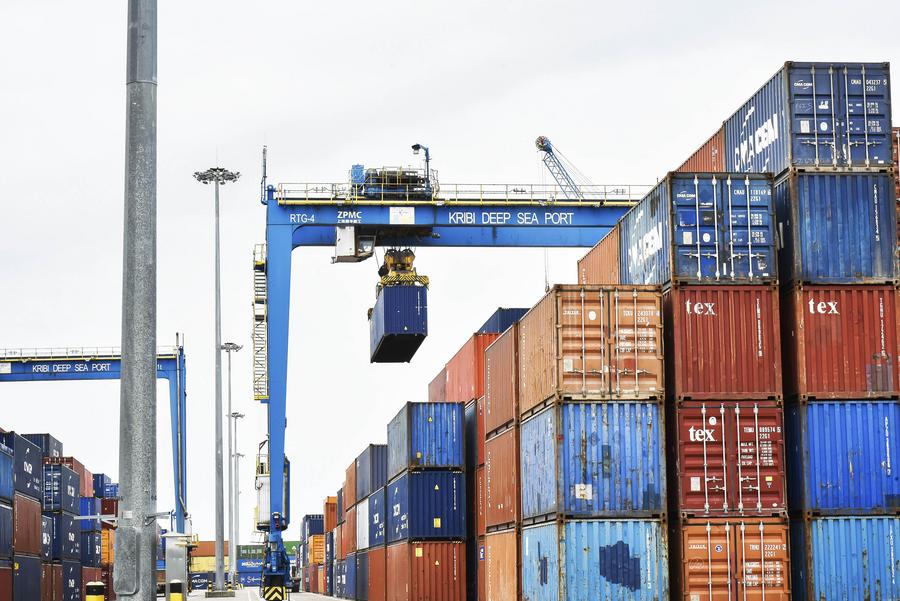
This file photo taken on March 15, 2022 shows cargo containers stored at Kribi Deep Seaport, Kribi, Cameroon. [Photo by Kepseu/Xinhua]
The second phase, expected to be completed by year-end, will add two berths to the existing two in the first phase. In addition, the government has allocated 15,000 hectares near the port for industrial and logistics parks, attracting multiple factories and logistics companies.
The Kribi-Lolabe Highway, built by CHEC, has been operational for nearly two years. Spanning 38.5 km, it includes six two-way lanes, with the central two reserved for future expansion, said Xu Huajiang, general manager of CHEC's Central Africa Division.
"This highway connects the Kribi Deep Seaport with major cities nationwide, facilitating personnel travel and goods transportation, thus promoting Cameroon's industrialization," said Emmanuel Nganou Djoumessi, Cameroon's minister of public works.
Over the past decade, China has built over 6,000 km of railways, 6,000 km of roads, nearly 20 ports, and more than 80 large power facilities in Africa, according to official data.
Under the China-proposed Belt and Road Initiative, China-Africa cooperation in infrastructure has yielded fruitful results, with high-quality projects playing a pivotal role in advancing Africa's industrial development and economic transformation.
"Africa's industrialization started late and has a weak foundation. Only by improving infrastructure, promoting connectivity, and achieving economic integration can Africa conduct large-scale industrial production and effectively integrate the sales market of industrial products," said Costantinos Berhutesfa Costantinos, a professor of public policy at Addis Ababa University in Ethiopia.
CULTIVATING "MADE IN AFRICA" BRANDS
Every day in the morning, Hellen Mugala, 27, joins hundreds of colleagues on their way to work at the Sino-Uganda Mbale Industrial Park, located in Uganda's eastern district of Mbale.
"This industrial park has helped many local people. I have acquired skills and earned a living from the Chinese company," Mugala said.
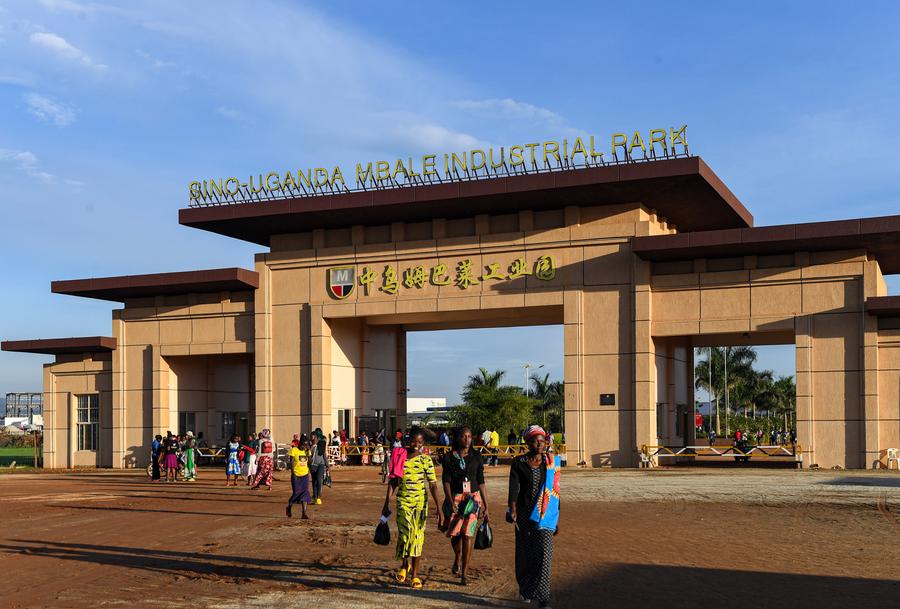
This photo taken on April 4, 2024 shows the entrance to the Sino-Uganda Mbale Industrial Park in Mbale, Uganda. [Xinhua/Li Yahui]
Located about 200 km from Uganda's capital Kampala, the national industrial park benefits from its proximity to three highways. Since its launch in March 2018, the park, invested and operated by the Chinese company Tian Tang Group, has attracted more than 40 companies and created over 5,000 jobs for locals, park authorities have said.
Spanning thousands of hectares, the park encompasses a wide range of sectors, including household appliances, daily beauty products, home fabrics, building materials, medicines, smartphones, televisions and automobiles.
Pearlight Technology Ltd, which manufactures lighting products, was one of the first companies to settle down in the park. By producing affordable LED lamps and offering repair services, the company significantly reduces Uganda's dependence on imported lighting solutions.
"Previously, Uganda's LED lamps were mainly imported, which made them expensive and hard to repair. Chinese enterprises have changed this situation. Now, our company produces about 3 million LED bulbs and tube lights annually, sold across Uganda," said Joseph Otim, a local technician at the company.
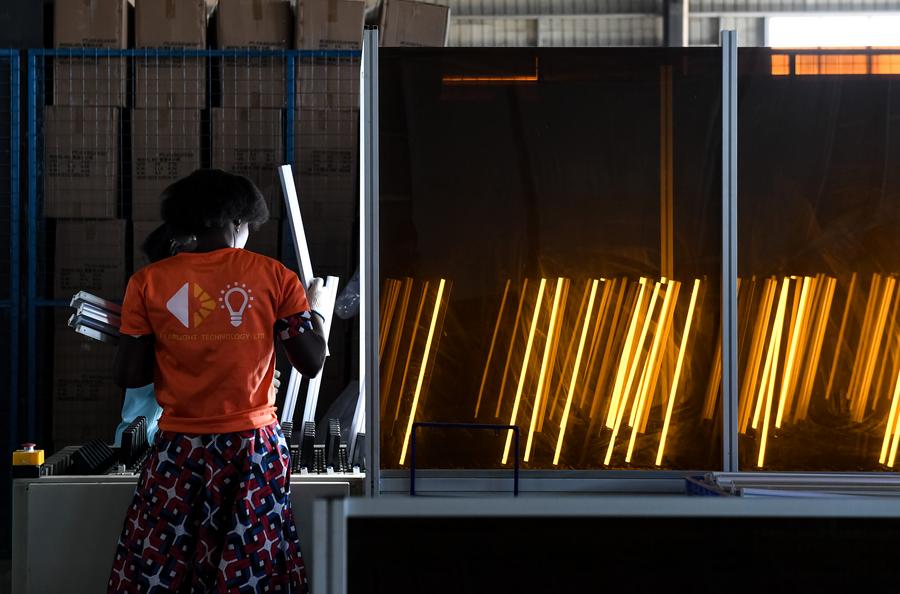
People work at Pearlight Technology Ltd at the Sino-Uganda Mbale Industrial Park in Mbale, Uganda, on April 5, 2024. [Xinhua/Li Yahui]
In recent years, African countries have been drawing on the industrial park development expertise of countries such as China.
Parks like the Diamniadio International Industrial Platform in Senegal, the Lekki Free Trade Zone in Nigeria, the Sino-Tan Industrial Park in Tanzania, and the China-Egypt TEDA Suez Economic and Trade Cooperation Zone have played a pivotal role in attracting investment.
They have rapidly assembled companies into industry clusters, enhanced industrial development advantages, and stimulated manufacturing growth, thereby accelerating the industrialization process across Africa.
China, a crucial cooperation partner for Uganda, has been providing capital and sharing skills and technology to develop energy and transport infrastructure, which are essential drivers of industrialization, David Bahati, Uganda's minister of state for trade, industry and cooperatives, told Xinhua in a recent interview.
"It is hoped that these industrial parks will be the birthplace of more local African brands so that 'Made in Africa' can go global," said Bahati.
CULTIVATING TALENT FOR NEW DEVELOPMENT
At the Southeast Orebody of the Chambishi Copper Mine in Zambia, a digital control screen provides real-time updates on the operational status of various processes, including mining, excavation, machinery, and transportation.
The mine, which had been closed for over a decade, is being redeveloped by NFC Africa Mining Plc (NFCA), a joint venture between China Nonferrous Metal Mining (Group) Co., Ltd., a centrally-administered state-owned enterprise, and a local Zambian company.
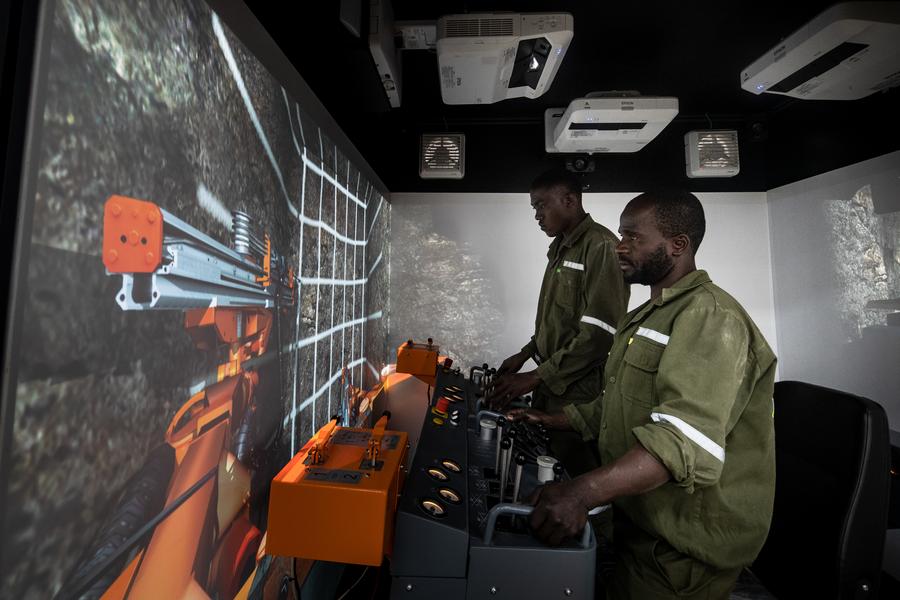
Local employees attend a training session via VR devices at NFC Africa Mining Plc (NFCA) in Kitwe, Zambia on June 3, 2024. [NFCA/Handout via Xinhua]
"Even without going underground, we can clearly understand the dynamics below," said Mwelwa Dean, assistant to the chief executive officer of NFCA.
Instead of relying heavily on manual labor for underground mining, the mine now employs a computerized system to control production processes, enhance business management and help front-line workers address safety issues.
Dean said the NFCA has established a center to train local employees. It uses virtual technology equipment and employs a standard training model that combines classroom training, on-site practice, and post-training evaluation. In 2023 alone, the center trained over 14,000 employees.
While the center in the copper mine has helped Zambia in training professionals, in the heart of Musanze Town in northern Rwanda, a transformative partnership is shaping the future of young Rwandans.
The Integrated Polytechnic Regional College-Musanze (IPRC Musanze), a public higher learning institution in Rwanda, has signed a five-year agreement with Jinhua Polytechnic from east China's Zhejiang Province for an exchange program, in which students from IPRC Musanze will study for two years in Rwanda and one year in China for an advanced diploma.
Ishimwe Yasil, a junior student in electrical automation technology at IPRC Musanze, was enthusiastic about studying digitalization and global commerce in China, which would enhance both his "practical skills and theoretical knowledge."
"As a developing country, Rwanda is actively introducing cutting-edge technologies. Electrical automation technology is found in all areas of modern industry, and studying this will contribute to the industrialization of our country," Yasil said.
"The importance of talent in innovative development cannot be overstated," said Gerishon Ikiara, an economist and former permanent secretary in Kenya's Ministry of Transport.
"In recent years, China has carried out a series of vocational education projects and established Luban Workshops in Africa, helping many African countries train technical talent for industrialization and turn their population dividend into a development advantage," said Ikiara.
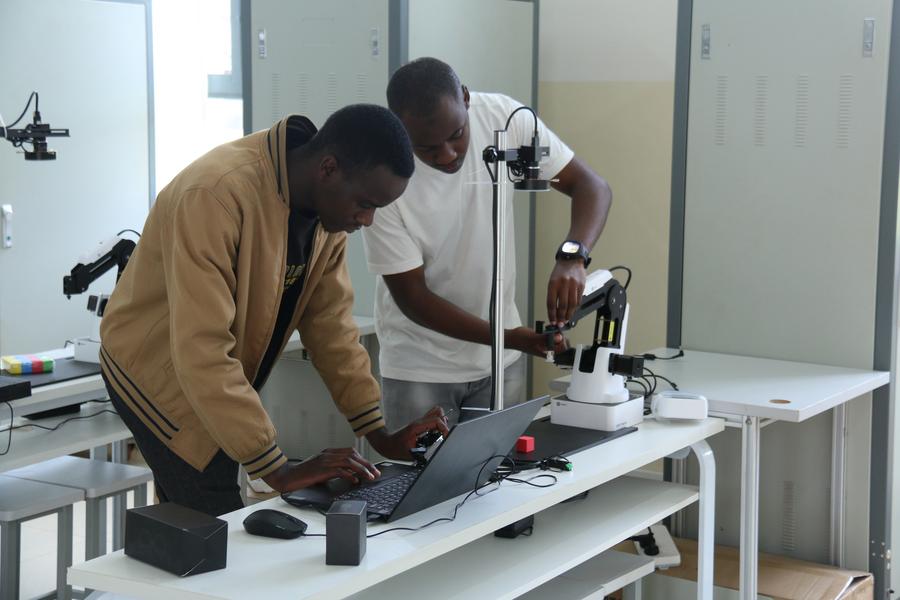
Local students operate devices in a laboratory of the Luban workshop at the Integrated Polytechnic Regional College-Musanze (IPRC Musanze) in Northern Province, Rwanda, Nov. 18, 2023. [Photo by Huang Wanqing/Xinhua]
Video reporters: Hua Hongli, Jin Zheng, Xu Ruiqing, Zeng Tao, Li Yahui, Xu Zheng, Wang Ze, Liu Fangqiang, Nie Zuguo, Peng Lijun, Ji Li, Lin Jing, Wang Zizheng, Yang Zhe, Hou Ming, Claude Bernard WONGOUE, Shi Yu, Guy-Gervais Kitina, Wang Huan, Zhou Haojin; Video editors: Zhang Yucheng, Zhao Xiaoqing, Zhang Yichi.
























